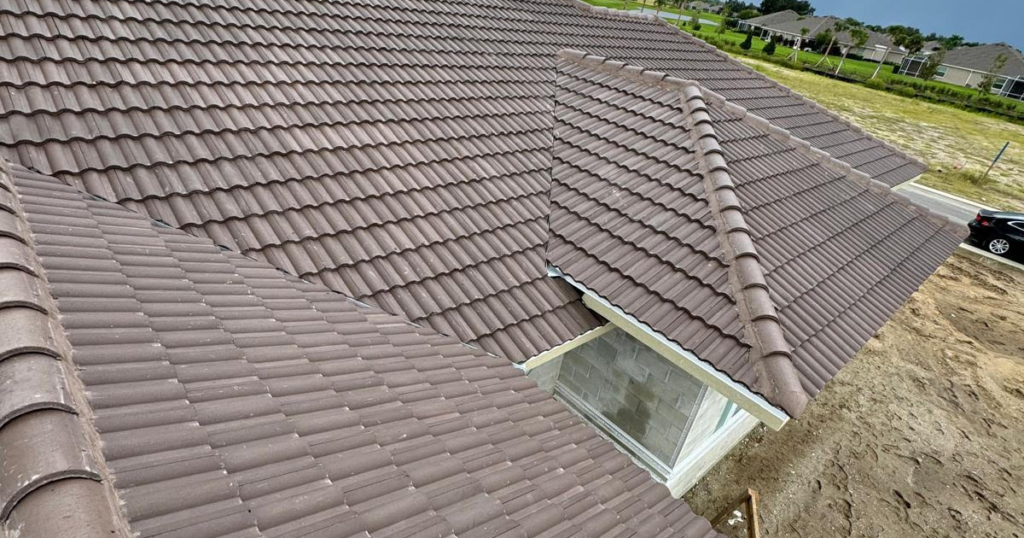A roof is one of the most critical components of your home, providing protection from the elements and contributing to the overall structural integrity of the building. When investing in a roof replacement, it’s essential to understand the warranty that comes with it. A roofing contractor typically offers a warranty as part of the installation process, but not all warranties are created equal. Knowing the ins and outs of roof replacement warranties can help you make an informed decision and ensure your investment is protected for years to come. Don’t leave your roof to chance secure a reliable roof replacement with a comprehensive warranty from a trusted roofing contractor. Contact us today to learn more about our warranty options and how we can protect your home.

Regular Roof Inspections
Storms can unleash a torrent of destructive forces that pose significant threats to homes, particularly to roofs. Ensuring that your roof is well-prepared for storms can save you from costly roof repairs and maintain the safety and integrity of your home. Here are some essential steps to prevent roof damage during storms.
Types of Roof Warranties
When you undertake a roof replacement, there are generally three types of warranties you should be aware of:
- Manufacturer’s Warranty– This warranty is provided by the manufacturer of the roofing materials used in your roof replacement. It covers defects in the roofing materials themselves. For example, if the shingles you choose fail due to manufacturing defects, the manufacturer’s warranty would typically cover the cost of new shingles.
- Workmanship Warranty- A roofing contractor usually offers this warranty, which covers the quality of the installation. If your new roof experiences issues because of improper installation or mistakes made by the roofing contractor, a workmanship warranty ensures those problems will be fixed at no additional cost to you.
- Extended Warranty- Some manufacturers offer extended warranties that go beyond the standard coverage. These warranties might include longer coverage periods, additional protection for certain types of damage, or comprehensive coverage that combines both material and workmanship warranties. Extended warranties often come at an additional cost but can provide peace of mind for homeowners looking to maximize the longevity of their roof replacement.
Key Considerations in a Roof Warranty
Understanding what’s covered under a roof replacement warranty and what isn’t is crucial. Here are some key factors to consider when reviewing a roof warranty:
- Coverage Period- One of the most important aspects of a roof warranty is the length of the coverage period. Manufacturer warranties can range from 20 to 50 years or even longer, depending on the product. Workmanship warranties from your roofing contractor typically cover a shorter period, such as 1 to 10 years. When considering a roof replacement, it’s essential to understand the length of coverage for both materials and workmanship.
- Transferability- If you plan to sell your home, the ability to transfer your roof warranty to the new owner can be a significant selling point. Not all warranties are transferable, so it’s important to ask your roofing contractor about this feature before committing to a roof replacement. A transferable warranty can add value to your home and provide peace of mind to potential buyers.
- Prorated vs. Non-Prorated Coverage- Some warranties are prorated, meaning that the coverage decreases over time. For example, a 30-year prorated warranty might cover the full cost of materials and labor for the first 10 years, but only a percentage of the costs for the remaining 20 years. Non-prorated warranties, on the other hand, provide full coverage for the entire warranty period. When discussing your roof replacement with a roofing contractor, be sure to clarify whether the warranty is prorated or non-prorated.
- Exclusions and Limitations- Every warranty has exclusions and limitations that outline what is not covered. Common exclusions include damage caused by severe weather, improper maintenance, or alterations made to the roof after installation. It’s essential to carefully review these exclusions with your roofing contractor to fully understand what is and isn’t covered under your roof replacement warranty.
A poor installation can lead to issues such as leaks, premature wear, and structural damage, which may not be covered under your warranty if they result from improper installation. To protect your investment, always choose a roofing contractor with a proven track record of quality workmanship and customer satisfaction. Protect your home with a quality roof replacement backed by a trusted warranty. Contact us to find out how our experienced roofing contractors can provide you with the best service and warranty coverage available.
How to Avoid Voiding Your Roof Warranty
- Improper Maintenance- Routine maintenance is key to extending the life of your roof and keeping your warranty intact. Neglecting regular maintenance, such as cleaning gutters, removing debris, and inspecting for damage, can void your warranty. Your roofing contractor can provide guidance on the specific maintenance requirements needed to uphold your warranty.
- Unauthorized Repairs or Alterations- Only qualified professionals should perform repairs or alterations on your roof. Attempting DIY repairs or hiring an unlicensed contractor can void your warranty, as these actions might not meet the manufacturer’s installation guidelines. Always consult your roofing contractor before making any changes to your roof to ensure they are performed correctly and do not affect your warranty.
Installing New Equipment- Adding new equipment to your roof, such as solar panels, satellite dishes, or skylights, can void the warranty if not done correctly. These installations may require puncturing the roofing material, which can lead to leaks if not properly sealed. Before installing any new equipment, check with your roofing contractor to see if the work can be done without voiding the warranty or if additional protection or warranties are available.
Failure to Register the Warranty- Some warranties require the homeowner to register the warranty within a certain timeframe after the roof replacement is completed. Failing to register the warranty or missing the deadline can result in the loss of coverage. Be sure to complete any necessary registration steps with the help of your roofing contractor to ensure your warranty is valid.
The Role of the Roofing Contractor in Warranty Protection
Your roofing contractor plays a vital role in ensuring your roof warranty is upheld. Here’s how a reliable roofing contractor can help protect your warranty:
Proper Installation: A qualified roofing contractor will install your roof according to the manufacturer’s specifications, which is essential for the warranty to remain valid.
Ongoing Maintenance: Many roofing contractors offer maintenance services to help keep your roof in top condition and comply with warranty requirements.
Warranty Claims Assistance: If you need to file a warranty claim, your roofing contractor can assist with the process, providing documentation and expert insight to support your claim.
Choosing the right roofing contractor is crucial not only for the quality of your roof replacement but also for the long-term protection of your roof warranty. Look for a contractor who is certified by the roofing material manufacturer and has a strong reputation for quality workmanship and customer service.
The Benefits of a Comprehensive Roof Warranty
A comprehensive roof warranty provides numerous benefits for homeowners, including:
- Peace of Mind: Knowing that your roof replacement is covered by a strong warranty gives you peace of mind that your investment is protected against defects and installation issues.
- Financial Protection: A roof warranty can save you thousands of dollars in repair costs if problems arise, making it a valuable part of your overall home protection plan.
- Increased Home Value: A transferable roof warranty can enhance your home’s value, making it more attractive to potential buyers if you decide to sell.
- Confidence in Your Contractor: Working with a roofing contractor who offers a solid workmanship warranty gives you confidence that the job will be done right the first time. Ensure your roof replacement is protected with a comprehensive warranty. Contact our expert roofing contractors today to discuss your options and secure the best coverage for your home.
In Conclusion
Understanding the details of roof warranties is essential for protecting your home and your investment. By choosing a roofing contractor who offers a comprehensive warranty and by following the necessary steps to keep your warranty valid, you can ensure your roof replacement provides reliable protection for many years to come. Remember, a roof warranty is only as good as the roofing contractor who stands behind it. Make sure to do your research, ask the right questions, and choose a contractor who is committed to quality workmanship and customer satisfaction. With the right warranty and contractor, your new roof will be a lasting asset to your home.


